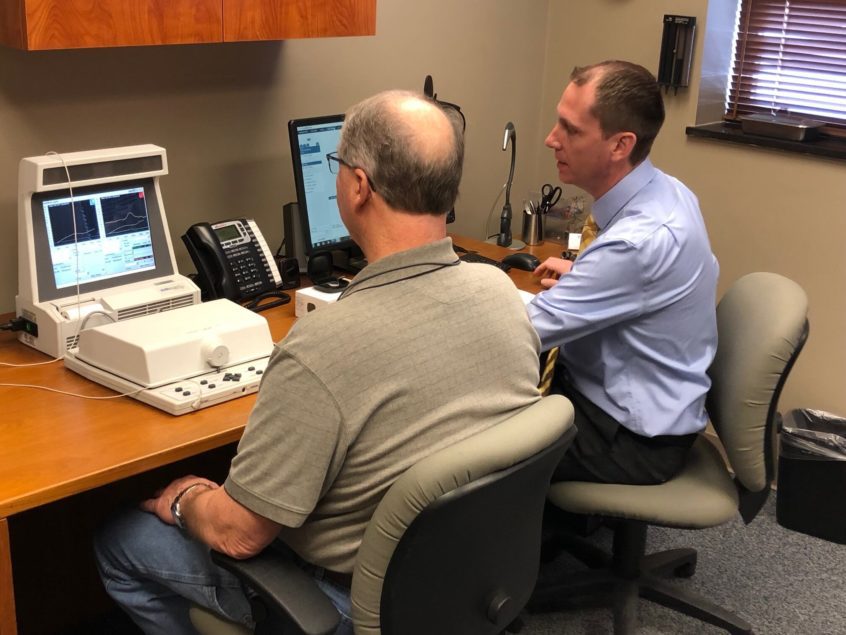When it comes to hearing loss and hearing aids, there are a lot of myths and misconceptions. Here, we dispel five common myths with the truth about hearing loss and hearing aids.
Myth #1 – Only old people have hearing loss or need hearing aids.
Reality – Our average patient is 60 years old; 50 percent are male, 50 percent are female. These patients are typically still employed and live very active lives. We work with each individual to determine the best hearing aid technology for their hearing loss, budget, and lifestyle. The latest hearing aids feature Bluetooth technology to connect wirelessly to the variety of devices we use in our everyday lives. This can make talking on a smartphone, watching TV, or streaming music a flawless listening experience.
Myth #2 – I can’t afford hearing aids.
Reality – There is a wide range of prices for hearing aids, depending on the features you select and the technology. We have hearing aids for every budget, starting at $675 per ear and going up to $2,600 per ear for private pay. If you have insurance that covers some or all of the cost of hearing aids, that also can be very helpful. In addition, remember that when properly cared for, hearing aids can last five to seven years. If you pay $4,000 for a pair of mid-range hearing aids, and they last you five years, that’s about $2.20 a day for something you use daily to hear better – that’s much less than a grande latte or smoothie every morning! In fact, hearing aids cost less over time than what most individuals spend on their smartphones and monthly mobile phone services. For those who qualify, financing options also are available to help make hearing aids more affordable.
Myth #3 – All hearing aids are the same.
Reality – Not all hearing aids are created equal. In fact, each of the major manufacturers has different product lines and features, which are sold via different marketing channels. For example, the latest technology is usually available first via private practice clinics. The same manufacturer may offer hearing aids at a big box store, but those hearing aids are typically older technology or not the premium option available in private venues. Be sure you ask when the hearing aids you are considering buying were released, and whether they can be serviced at other audiology clinics. Some hearing aids sold in warehouse or retail environments are locked (locked software), and can only be serviced at those establishments, while technology sold in private clinics is usually open technology that can be worked on by other audiologists or hearing professionals.
Myth #4 – It doesn’t matter who you buy your hearing aids from.
Reality – Ninety percent of your success in wearing hearing aids is based on the relationship you have with the person who evaluates, recommends and fits your hearing aids. Patients who work with doctoral-level audiologists generally report a higher level of satisfaction with their overall clinic experience, and are more satisfied with their technology. Only doctoral-level audiologists work with Associated Audiologists with loyal tenures so you can expect consistent providers you know.
Audiologists receive extensive education in hearing and balance disorders. They have earned postgraduate masters and/or doctoral degrees. A doctoral degree is now required for graduates practicing after 2012. You may look for the initials Au.D., (Doctor of Audiology—clinical degree); or Ph.D. (Doctor of Philosophy—research and/or clinical research degree); to designate doctoral training.
As part of their four-year doctoral training, these audiologists spend a final year completing an externship experience supervised by a licensed audiologist. The externship provides practical, hands-on, advanced experience.
Myth #5 – Hearing loss only affects your ability to communicate. It doesn’t affect your health.
Reality – Hearing loss impacts many aspects of your life – the most obvious is your ability to communicate with friends and family. But many people don’t realize the far-reaching implications hearing loss can have on your relationships and your health. Social consequences of hearing loss include avoidance or withdrawal from social situations along with rejection and loneliness. Psychologically, hearing loss correlates to stress and depression. And physically, hearing loss has been linked to chronic illnesses such as diabetes and heart disease. Plus, research shows individuals who can’t hear well have reduced alertness and are at increased risk for their personal safety; have reduced job performance and earning power; and experience negative long-term effects on brain function and memory.
Learn more about why it’s important to address hearing loss early on. Download our free e-book, How Today’s Hearing Aids Can Help You Hear Better.



